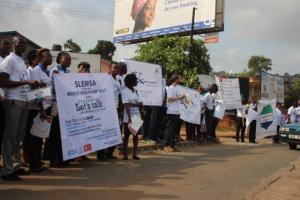Tackling mental illness after Ebola
Following the Ebola crisis, a decade-long Civil War and with significant poverty, depression is estimated to be very common in Sierra Leone, affecting at least three percent of the population in any single year. Mental health practitioners also report that anxiety, psychosis and substance abuse are significant public health concerns.
Despite this, mental health is rarely talked about; awareness is low and many of those in need do not seek treatment. High levels of discrimination against people affected as well as cultural beliefs mean people are too often afraid or reluctant to ask for medical help. Others simply lack knowledge about available services.
Understanding the mental health impacts of Ebola
K.A. is a 34-year old student of Library Sciences at the University of Sierra Leone. Prior to the Ebola crisis he was known as a smart and happy young man, and his future looked bright. His mother had just bought him a car as a reward for getting into university and promised him much more on his graduation. Then on 27th September 2014, K.A.’s elder brother suddenly became sick. The family thought he had been bewitched. After one week, the brother died; the father also passed away on 28th October 2014. Following the burial of the father, another 18 relatives became infected and died.
Soon, K.A. found himself feeling unwell. When he went to a holding centre, he too tested positive for the Ebola virus. He was then transferred to an MSF-run Ebola Treatment Unit (ETU) in Bo City, 234 km from Freetown. The first night he was there, seven people died in his room. Three days later, his two younger brothers were also brought to the same ETU. They too died. K.A. begun to lose hope; he thought it was a curse on his family. He began collecting his medicines. He swallowed them all in one go, hoping to end his suffering, but somehow he did not die. He thought this time, God must have saved him for a reason.
When K.A. was finally discharged from the ETU, he returned home to find all of his property burnt and destroyed. He was also exposed to a great deal of stigma in his community. When he would join a group of friends, they found a reason to move away: they remembered an errand or somewhere they had to go. In the “Cook Shop” (makeshift restaurant), they gave him a special plate and spoon. Some would even tell him to go and sit, alone, under the mango tree. If he was seated in a taxi and someone he knew saw him, they would covertly warn off those around him, by identifying him as an Ebola Survivor. He began again to wonder why he had lived, if he was to suffer like this.
Talking about mental health among Survivors
Things slowly changed once K.A. was referred to Mohamed, a Psychosocial Counsellor working with MSF. By then, K.A. did not want to talk, and saw no reason for living. However, Mohamed talked to him and continued to talk, even when K.A. would not answer. Eventually, K.A. begun to regain his hope through these visits and the counselling he received.
“I owe my life to this young man through his intervention, his concern, and taking the time to visit me. As time went on, I began once more to see the reason for living,” he says today.
According to Florence Baingana, Mental Health Lead at WHO Sierra Leone, depression is a frequent sequelae of EVD. “The cause can be a combination of trauma and loss: not just family, but property and jobs, combined with high levels of stigmatization.” Many Survivors also have disabling physical complaints such as uveitis, cataracts that sometimes lead to blindness, as well as muscle aches and pains, which can add to emotional distress.
Response of the Government of Sierra Leone
Together with partners such as the African Development Bank, JSI, USAID, IMC and Sierra Leone’s Mental Health Coalition, WHO is supporting the country’s Ministry of Health and Sanitation to expand and improve available mental health services, including through the Comprehensive Programme for Ebola Survivors (CPES).
Two Sierra Leonean psychiatrists have recently returned to Freetown, adding to a small but growing number of specialists working in the country. In the longer term, the Government plans to strengthen its training programmes so that there are more mental health nurses and doctors moving up through the system.
Trainings of frontline health workers have also now commenced in the Mental Health Gap Action Programme and Psychological First Aid (‘listening and helping’) approaches, so that they too can recognize and manage common mental health disorders.
Across Africa, people affected by mental illness too often suffer in silence, battling shame, stigma, and isolation, from their community and from treatment. This year’s World Health Day on April 7 focused on depression, and encouraged people to talk more about mental health, to help tackle some of these issues.
Now, we must ensure the conversation continues, to give mental health the attention it so urgently requires.




